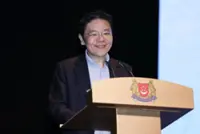When 68-year-old Richard Han heads to the ballot box tomorrow to vote in Singapore’s election, cost-of-living pressures will be on the retiree’s mind as he worries about his daily expenses and his son’s prospects after university.
Financial consultant Catherine Tan also worries about the future for her two young children.





